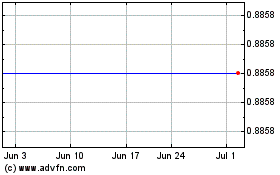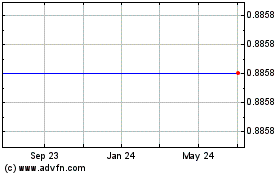Shenzhen-Hong Kong Trading Link Gets Off to Slow Start
December 05 2016 - 3:30AM
Dow Jones News
HONG KONG—The opening of a trading link between the Hong Kong
and Shenzhen stock markets met with a muted response from
investors.
At the midday trading break Monday, investors based outside
China had piled around 1.6 billion yuan ($230.5 million) into the
Shenzhen market—home to some of the country's fastest-growing
companies in sectors like technology, pharmaceuticals and consumer
goods—while Chinese investors had put some 521 million yuan ($75.1
million) into Hong Kong stocks. Those totals represent 12% and 5%,
respectively, of the daily limits for the link known as Stock
Connect.
The Shenzhen Composite Index was off 0.8%; Hong Kong's benchmark
Hang Seng Index, off 0.3%.
The underwhelming activity comes despite a monthslong buildup,
as the opening coincided with a number of events that weighed on
global markets during Asian trading hours. Italy's prime minister
resigned after losing a key referendum vote, while U.S.
President-elect Donald Trump criticized China's currency and trade
policies via Twitter.
Investors were also shaken by harsh criticism over the weekend
from China's top securities regulator Liu Shiyu of the practice of
using borrowed funds to build big stakes in companies, which he
called "barbaric" and "industrial robbery."
The latest Stock Connect allows global investors to trade 881
shares listed in Shenzhen and opens more Hong Kong stocks to
mainland Chinese investors. Analysts say the Shenzhen market's
wealth of companies in faster-growing parts of economy could in
time make it more attractive to foreign investors than the Shanghai
market, dominated more by less dynamic state-owned enterprises such
as banks and oil companies.
"There are definitely a few companies that trade in Shenzhen
that people have liked for a while but didn't have easy access to
before," said Joshua Crabb, head of Asian equities at Old Mutual
Global Investors. "It's very natural to see these stocks starting
to gain from some institutional attention." The Shenzhen market is
dominated by retail investors, a factor cited in its well-earned
reputation for volatility.
In Hong Kong, an opening ceremony for the new Stock Connect was
more restrained than the one for a similar link with Shanghai two
years ago, as was investor response. On that earlier launch day,
around two-thirds of the daily quota for Shanghai shares was used
up in the first 45 minutes of trading.
For much of this year, more money has flowed "southbound"
through the linkâ "from Shanghai into Hong Kongâ "than the other
way.
Among the Shenzhen-traded companies analysts point to are
Hikvision, a video-surveillance provider, Wanda Cinema Line, the
world's biggest movie-theater operator, and Gree, a leading
home-appliances maker. Monday's big winners, though, were
lesser-known companies, with video-display maker Shenzhen Silkroad
Digital Vision Co. Ltd. and cable maker Nanjing Quanxin Cable
Technology both rising by 10%, the daily limit allowed on the
exchange.
Some long-term investors seem to have "already done their
homework" on Shenzhen, said Nicole Yuen, vice chairman and head of
equities for Greater China at Credit Suisse, adding, though, that
she expects only gradual growth in northbound trading volume
through the link.
"It will not be abrupt," she said.
Yifan Xie in Shanghai and Gregor Stuart Hunter in Hong Kong
contributed to this article.
(END) Dow Jones Newswires
December 05, 2016 03:15 ET (08:15 GMT)
Copyright (c) 2016 Dow Jones & Company, Inc.
Credit Suisse (NYSE:CS)
Historical Stock Chart
From Mar 2024 to Apr 2024

Credit Suisse (NYSE:CS)
Historical Stock Chart
From Apr 2023 to Apr 2024
